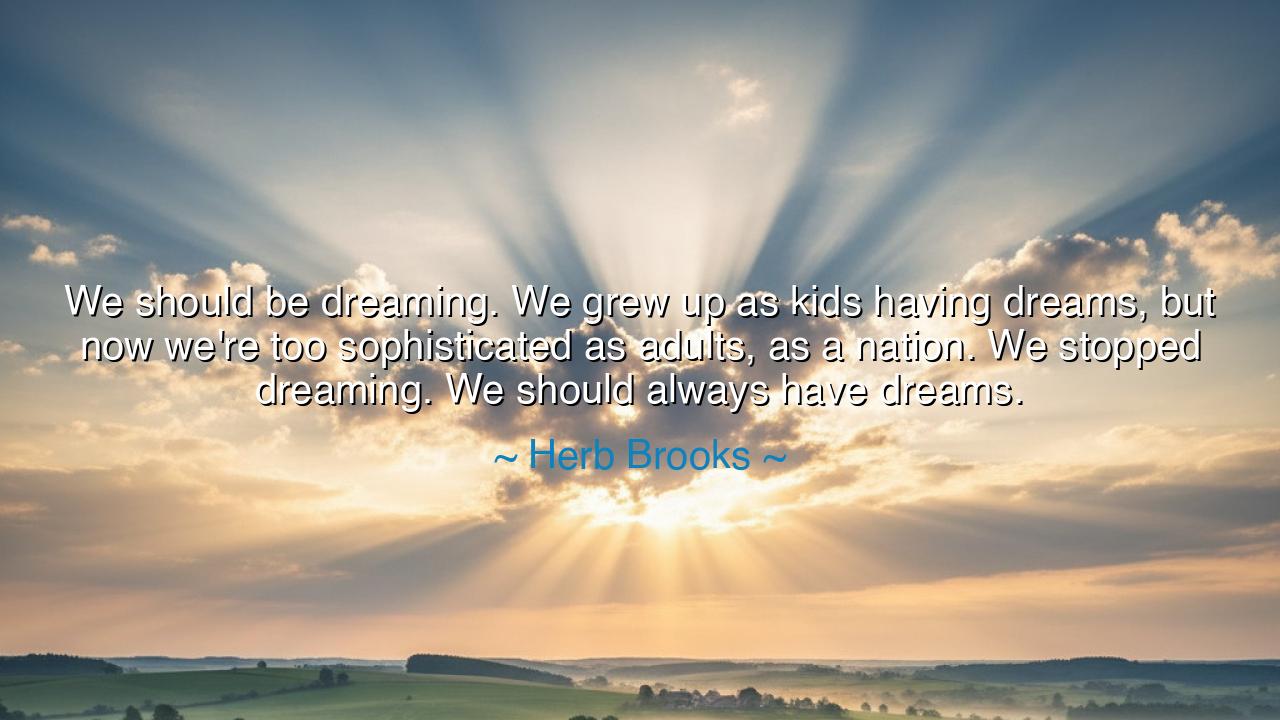
We should be dreaming. We grew up as kids having dreams, but now
We should be dreaming. We grew up as kids having dreams, but now we're too sophisticated as adults, as a nation. We stopped dreaming. We should always have dreams.






In the journey of life, there exists a truth as old as humanity itself: the power of dreams. Herb Brooks’ words, “We should be dreaming. We grew up as kids having dreams, but now we're too sophisticated as adults, as a nation. We stopped dreaming. We should always have dreams,” strike at the heart of a great loss that occurs when the youthful vision of the future is dulled by the harshness of reality. Brooks speaks not just of individual dreams, but of the collective dream of a society that once believed in its potential to achieve greatness, only to have that belief muted by sophistication, pragmatism, and the daily grind of adult responsibilities. To dream, Brooks suggests, is to tap into the very essence of what makes us human, and to stop dreaming is to lose touch with the infinite possibilities before us.
In the ancient world, the great heroes and leaders were defined by their ability to dream and pursue those dreams with unwavering determination. Take, for instance, Alexander the Great, whose vision extended far beyond the world he knew. His dreams were not just to conquer lands, but to create an empire that bridged cultures and civilizations. His vision of a united world was so powerful that it pulled him through insurmountable obstacles, creating a legacy that would echo through the ages. Alexander’s story is not just about military conquests, but about the belief in a dream that transcended his time and place. In the same way, Brooks urges us to remember that dreams are what give life meaning, and to stop dreaming is to diminish the very spirit of human potential.
The Greeks also understood the power of dreams. In Homer’s Odyssey, Odysseus embarks on a long and perilous journey not merely out of necessity but because he was driven by a dream—a dream to return to his family, his home, and his rightful place in the world. Along the way, he faces temptations, trials, and hardships, but it is the dream of home that keeps him moving forward. Odysseus’ dream becomes a metaphor for every human journey: it is our dreams that sustain us when the road is long, and it is the refusal to give up on those dreams that defines our courage and resilience. Brooks, in urging us to continue dreaming, calls us to reconnect with that visionary spirit that moves us forward even when the destination seems distant.
In the modern era, the importance of dreams has not waned. Consider the story of Walt Disney, a man who faced repeated failures, rejections, and even bankruptcy, yet continued to dream. His dream of creating a magical kingdom that brought joy to millions of people worldwide began not as a grand empire, but as a simple vision of what could be. Disney was often told his dreams were too big, but his determination to continue creating something new and inspiring drove him to build a legacy that has endured for generations. Like Disney, Brooks reminds us that dreams are the foundation of innovation and progress, and without them, the world loses its capacity for transformation.
The lesson in Brooks’ words is clear: dreams are not just for children; they are for adults, for nations, and for societies. As we grow older, we often trade in the foolishness of youthful dreams for the realities of responsibility, but in doing so, we risk losing our connection to the very force that drives us toward greatness. Dreams are the fuel that sparks innovation, the motivation that propels us beyond the ordinary, and the force that shapes the future. The world’s greatest achievements, from the moon landing to the civil rights movement, were born not out of practicality alone but out of the vision that something better, something greater, could be achieved.
In your own life, consider what dreams you have left unspoken or unpursued. Do you still dream with the same passion and vision that you had as a child, or have you allowed the weight of the world to extinguish those dreams? Brooks’ message is a powerful reminder that dreams are the soul’s compass—they point us in the direction of our highest potential. Let your dreams, no matter how grand or impossible, pull you forward. Don’t let the harshness of the present sophisticate you into submission. The path to greatness, whether on the personal or collective level, is always driven by a refusal to let go of what could be.
Let this lesson guide you as you move forward: dream boldly, dream often, and most importantly, never stop dreaming. Just as Alexander, Odysseus, and Disney achieved greatness through unwavering belief in their dreams, so too can you. Let your dreams be your guiding light, your motivation, and your legacy. In doing so, you will not only create your own future but inspire others to reach for their own dreams, creating a ripple effect that spreads through the world, just as it has throughout history. Dreams are the essence of who we are, and to live without them is to live without purpose.






AAdministratorAdministrator
Welcome, honored guests. Please leave a comment, we will respond soon